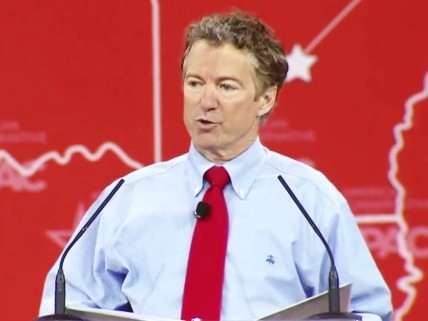Is Rand Paul's Drug Policy Libertarian?
No, but he leans further in that direction than any other Republican senator or major-party presidential candidate.

The Hill reports that Rand Paul is "the first top-tier presidential candidate from either party to make marijuana reform a major campaign issue." Yet both Jedd Legum at Think Progress and Joan Walsh at Salon cite the Kentucky senator's position on marijuana as evidence that "Rand Paul Is Not A Libertarian," as the headine over Legum's piece puts it. What's up with that?
The apparent contradiction stems from Paul's reluctance to endorse marijuana legalization, a policy he nevertheless thinks states (and the District of Columbia) should be free to pursue. "I think there should be a certain amount of discretion for both states and territories and the District," Paul told reporters last November. "I'm not for having the federal government get involved. I really haven't taken a stand on…the actual legalization…but I'm against the federal government telling them they can't."
Consistent with his federalist position, Paul is a lead sponsor of the CARERS Act, which would amend the Controlled Substances Act (CSA) so that the federal ban on marijuana does not apply to people who grow, distribute, or use the drug for medical purposes in compliance with state law. A similar approach to states that legalize cannabis for recreational use—as reflected in the Respect State Marijuana Laws Act, introduced by Rep. Dana Rohrabacher (R-Calif.) in 2013—would effectively repeal the national ban, limiting the federal government's role to assisting states that decide to continue prohibiting pot.
Defederalization is a peristent theme in Paul's discussions of drug policy, going back at least 15 years. In a 2000 appearance on the public affairs show Kentucky Tonight, for instance, Paul, at the time chairman of Kentucky Taxpayers United, had this exchange with a caller:
Caller: My plan is to legalize all drugs and take the money that we spend to keep the drugs out of the country, put that into Social Security, and release all nonviolent drug offenders…take the money that we would spend in housing these inmates, put that into Social Security. Now that money is going to end the money problems with Social Security. I would like to hear you guys comment on that.
Paul: I would agree with him. I think they are sort of separate issues, and obviously you can take the savings from one. But I would agree with him: The war on drugs is an abysmal failure and a waste of money. And we should better spend [the money] dealing with people, with their addiction problems, quit wasting all the money, sending the military to Bolivia to shoot farmers who are growing coca plants. That's just ridiculous. So I do agree with him there: Just end that war on drugs and make it a much more local situation, more community oriented…There's probably a lot of savings in that.
As I noted last October, it's not clear exactly which part(s) of the caller's proposal Paul agreed with. When HBO talk show host Bill Maher asked Paul about that 2000 exchange last November, here is how the senator responded:
Maher: You said in 2000, "The war on drugs is an abysmal failure and a waste of money." Are you still on that page?
Paul: I'm absolutely there, and I'll do everything to end the war on drugs….The war on drugs has become the most racially disparate outcome that you have in the entire country. Our prisons are full of black and brown kids. Three-fourths of the people in prison are black or brown, and white kids are using drugs, Bill, as you know…at the same rate as these other kids. But kids who have less means, less money, kids who are in areas where police are patrolling…Police are given monetary incentives to make arrests, monetary incentives for their own departments. So I want to end the war on drugs because it's wrong for everybody, but particularly because poor people are caught up in this, and their lives are ruined by it.
It is still not entirely clear what Paul means by ending the war on drugs. But the disparities that worry him cannot be fully addressed as long as the government continues to arrest people for supplying arbitrarily proscribed intoxicants (although they can be mitigated by the sentencing reforms he supports). Similarly, when Paul rebuked Jeb Bush for continuing to support the arrest of cannabis users even while admitting his own youthful pot smoking, the implicit message was that consumption should not be treated as a crime, which raises the question of why production should be. "This is a guy who now admits he smoked marijuana but he wants to put people in jail who do," Paul said. "He was even opposed to medical marijuana."
In short, Paul is shy about explicitly advocating drug legalization, possibly because he worries about the response from social conservatives. But he leans further in that direction than any other Republican senator or major-party presidential candidate.


Show Comments (58)